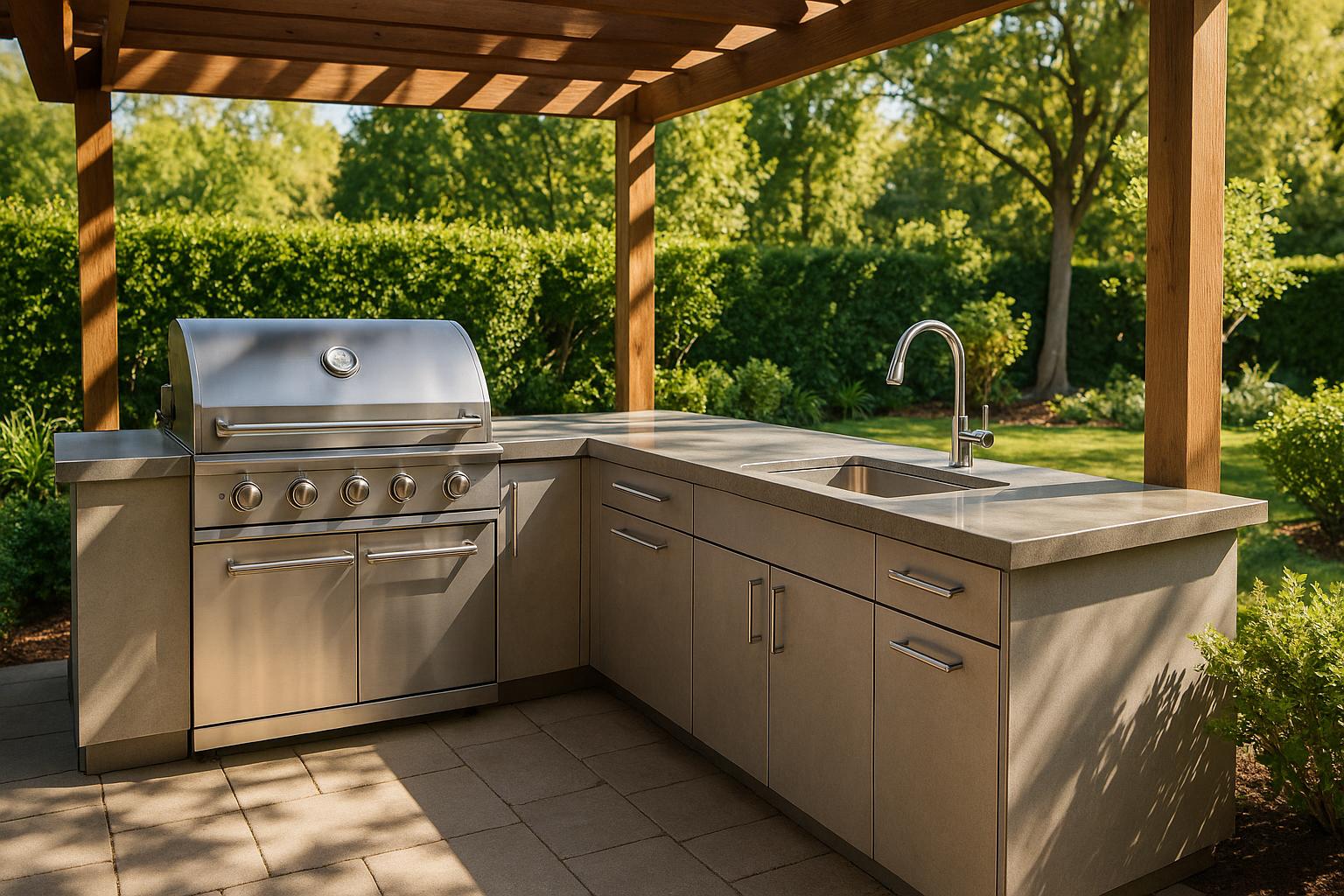- bhavya gada
- No Comments
Want your outdoor kitchen to last for decades? Regular maintenance is the key. Without it, Maryland’s tough climate – hot, humid summers and freezing winters – can cause rust, stains, cracks, and costly damage. Here’s what you need to know:
- Daily Care: Clean grills, countertops, and sinks after every use. Remove grease and debris to prevent buildup and stains.
- Seasonal Maintenance: Prep in spring and winterize in fall. Drain water lines, seal stone surfaces, and protect appliances with covers.
- Material-Specific Tips: Stainless steel needs rust protection, stone countertops require sealing, and wood cabinets benefit from annual resealing.
- Drainage: Ensure proper water flow to avoid pooling, mold, and structural damage.
- Inspections: Check appliances, gas connections, and surfaces monthly for early signs of wear.
For complex repairs or drainage issues, consult local professionals. With consistent upkeep, your outdoor kitchen can withstand Maryland’s unpredictable weather and maintain its value.
Outdoor Kitchen Maintenance Tips for Backyard Success!
Daily Cleaning and Care
Taking care of your outdoor kitchen in Maryland starts with a consistent daily cleaning routine. The combination of humidity, grease, and heat that comes with regular use demands prompt attention. Ignoring daily maintenance can lead to stubborn stains and expensive repairs down the road.
As one expert puts it:
"After every use, you need to clean kitchen grease to prevent tough build-up that will be harder to clean the longer it sits." [3]
This daily habit lays the foundation for keeping each part of your outdoor kitchen in great condition.
Cleaning Grills, Countertops, and Sinks
When it comes to grills, timing is everything. Clean your grill right after cooking by running it on high heat for 15–20 minutes to burn off food residue [6]. Once it cools slightly, use a stiff brush to scrub the grates and remove any leftover particles or grease [2]. For a deeper clean, use a grill cleaner designed for your specific grill type – be it gas, charcoal, or pellet [2]. To prevent rust, finish with a thin layer of oil on the grates [2].
Countertops need a tailored approach based on their material. For most surfaces, a quick wipe-down with mild detergent and warm water after use is sufficient [4]. Stone countertops, however, require extra care – generic cleaners can damage the surface, so opt for products specifically formulated for granite, marble, or your particular stone type [4]. Porcelain surfaces are easier to maintain; just use warm water and mild detergent, but avoid abrasive pads that could scratch the finish [5][6]. Be especially vigilant with spills from acidic substances like lemon juice or wine, as they can cause permanent stains if not cleaned immediately [2].
Sinks are another area that benefit from daily attention. After each use, wipe down the sink and faucet to remove soap scum, grease, and food particles [2]. For stainless steel sinks, a sponge and soapy water are usually enough to keep rust at bay [9]. For tougher stains, a product like Bar Keepers Friend works wonders [8]. To make future cleaning easier, you can apply a polish like Hope’s Perfect Sink Cleaner, which creates a water-repellent barrier [8].
Removing Debris and Preventing Build-Up
Keeping debris in check is just as important as surface cleaning. Regularly clear away food scraps, leaves, and other debris from your cooking and prep areas. This is especially crucial in Maryland, where falling leaves can quickly pile up and stain surfaces as they decompose.
Your sink drain also needs some love. A simple weekly routine – mixing baking soda with vinegar, letting it sit for 15 minutes, and flushing with hot water – can help prevent clogs and odors [2].
Managing grease is another priority, especially in humid climates. Grease not only attracts dirt but can also create sticky surfaces and stain porous materials. Keep degreasers handy – vinegar works well for light buildup, while commercial options tackle tougher messes [7].
Having the right cleaning tools on hand makes daily care much easier. Stock up on essentials like grill brushes, soft cloths, sponges, wire brushes for stubborn grime, and even aluminum foil for scrubbing tough spots [7]. Protective covers are also a smart investment to shield your grill and appliances from Maryland’s unpredictable weather, including afternoon storms and morning dew [7].
Spending just 10–15 minutes a day on cleaning can save you hours of deep scrubbing later and helps protect your outdoor kitchen for years to come.
Seasonal Care and Weather Protection
Maryland’s weather can be tough on outdoor kitchens. From humid, stormy summers to freezing, snowy winters, your setup faces year-round challenges. Staying ahead of these seasonal shifts is essential to avoid costly damage and ensure your outdoor kitchen remains in top shape.
As extcabinets.com points out:
"In our experience, the first mistake many homeowners make is thinking that their outdoor kitchen can handle whatever weather comes its way." [14]
This assumption often leads to expensive repairs that could have been avoided with proper preparation.
Spring Setup and Fall Preparation
Spring is the season to revive your outdoor kitchen, but jumping in without a thorough inspection can spell trouble. Start by checking your gas connections for any winter damage – look for loose fittings, corrosion, or signs of wear. Test each burner to ensure it ignites properly and functions as it should.
When restoring your water supply, do it gradually. Inspect plumbing connections for leaks and ensure all electrical outlets and fixtures are working. Replace any damaged weatherstripping around electrical boxes to keep moisture out and connections safe.
Fall preparation is your safeguard for winter. Begin with a deep clean – removing dirt and debris helps prevent staining and reduces the risk of mold or rust. Draining water lines is crucial. Turn off the main water supply, open all faucets, and ensure no water lingers in the system to avoid freezing damage.
Gas appliances need attention before winter, too. Clean your grill thoroughly, season the cooking surfaces with a light coat of oil, and turn off the gas line at the main connection [10]. This prevents potential leaks during the colder months.
Once your spring and fall tasks are complete, you’ll want to shift your focus to protecting your outdoor kitchen during Maryland’s harsh winters.
Winter Protection Tips
Appliance care is critical. For refrigerators and ice makers, empty them completely, unplug, and dry them out before covering [10] [11] [12]. Cabinets need attention based on their material – seal wooden cabinets and polish stainless steel to guard against moisture and rust [10]. Don’t forget to remove all food from storage areas, as even sealed packages can attract rodents looking for a warm winter shelter.
Electrical safety is especially important in winter. Unplug non-essential appliances and, if possible, shut off power to the entire outdoor kitchen area [11]. This reduces the risk of damage from power surges during storms and prevents moisture from causing electrical hazards.
Pipe insulation is a must for Maryland’s cold snaps. Insulate exposed pipes in unheated areas like basements or crawl spaces [13]. Even pipes along exterior walls, which might seem safe, can freeze during prolonged cold spells.
Covering your outdoor kitchen adds an extra layer of protection. While durable materials like powder-coated stainless steel are designed to handle winter weather, breathable covers provide additional security [12]. Avoid fully sealed covers that trap condensation, which can lead to damage. As Danver from extcabinets.com notes:
"Although powder-coated stainless steel can be left uncovered in the winter months, covering adds extra protection which can never hurt." [12]
Beyond covers, consider upgrades like roof structures or pergolas to shield your kitchen from snow buildup. Outdoor heaters can also make your space usable on milder winter days [12]. These additions not only protect your kitchen but can also extend its functionality throughout the year.
Countertop, Cabinet, and Appliance Maintenance
Taking care of your countertops, cabinets, and appliances is key to keeping them in good shape and avoiding expensive repairs – especially in Maryland, where summers can be scorching and winters freezing. Here’s how to protect these essential parts of your outdoor kitchen.
Sealing and Protecting Natural Stone
Granite countertops are a favorite for outdoor kitchens because they hold up well against the elements. But even granite needs regular maintenance to stay in top condition. Rain, UV rays, and temperature swings can wear down its protective seal, so keeping it sealed is a must [16].
To check if your granite needs resealing, pour a small amount of water on the surface. If it soaks in within a few minutes, it’s time to reapply a seal [5]. When selecting a sealer, steer clear of products with silicone or linseed oil. Instead, go for sealers made with fluorocarbon aliphatic resin or silane/siloxane compounds, which typically last 3–5 years [5]. These sealers are especially effective against Maryland’s wet seasons.
For daily care, clean the surface with mild soap and water. For tougher stains, use a water-diluted isopropyl alcohol solution or a baking soda paste [5]. Avoid harsh cleaners like vinegar, ammonia-based products, bleach, or abrasive pads, as they can weaken the seal and harm the stone [5][17].
To prevent damage, always use cutting boards, avoid dragging rough items across the surface, and place trays under items like oils, wine, or citrus fruits [5]. Covering your countertops when not in use can minimize cleaning and help the seal last longer [15][16]. After storms or particularly harsh winters, inspect the granite and reseal if needed [5].
Preventing Rust and Stains on Metal Parts
Stainless steel appliances are built to resist rust thanks to their chromium content, which forms a protective layer. However, Maryland’s humid summers and occasional salty coastal air can challenge this protection, making regular maintenance essential.
Clean your stainless steel appliances often using mild soap and water, and dry them thoroughly to prevent moisture buildup, which can lead to corrosion [18]. Avoid cleaners with chlorides or harsh chemicals, and never use steel wool or abrasive brushes, as these can scratch the surface [18]. If your appliances come into contact with salt or chlorides, rinse them immediately with fresh water [18].
For weekly upkeep, use a stainless steel cleaner and always wipe in the direction of the grain [19]. Alternatively, you can clean with vinegar to remove grime, then polish with a little olive oil for shine [19]. To add extra protection, consider applying a silicone-based coating to create a moisture barrier [18]. WD-40 can also work: apply it, buff with a clean towel to form a protective layer, and then wash off any residue with soapy water [18].
For grills, stick to a stainless steel cleaner and follow the grain for the best results.
"Exposure to sun and rain will prematurely age your barbecue, making it look worn and old." [20]
Regularly inspect your appliances for signs of rust or discoloration. Catching problems early can save you from costly repairs down the line [18].
Maintaining Treated Wood Cabinets
Wood cabinets add warmth to your kitchen setup, but they need proper care to withstand the elements. Treated wood cabinets should be sealed annually to protect against weather damage. To check if it’s time to reseal, perform a water-bead test: if water beads on the surface, you’re good; if it soaks in, it’s time to reseal [21].
For a natural pine look, use a clear water repellent. If you want added UV protection, choose a stain that offers both water repellency and UV stabilization [21].
"Apply within six weeks of completion and reapply annually." [21]
If your cabinets are painted, start with an alkyd oil-based primer and follow with two coats of high-quality acrylic latex paint. This combo creates a strong barrier against Maryland’s harsh weather conditions. Timing is everything – some treated lumber can be finished in as little as 30 days, while others, like RainWood, may need more time to dry. Kiln Dried After Treatment wood, on the other hand, is ready to be finished right away [21].
These steps not only protect your wood cabinets but also tie seamlessly into your broader seasonal maintenance routine. Proper care ensures your outdoor kitchen stays functional and attractive for years to come.
Drainage and Water Management
Water can wreak havoc on your outdoor kitchen if not properly managed. Without adequate drainage, you might face pooling water, damaged countertops, warped cabinets, and even mold or mildew problems. Maryland’s weather – characterized by heavy spring rains and summer storms – makes it especially important to address drainage issues from the start to avoid costly repairs.
When designing your outdoor kitchen, make sure surfaces like countertops and flooring are slightly sloped. This helps water run off instead of collecting in pools [1]. After heavy rain, check for standing water, as even small puddles can lead to long-term damage.
Keeping your drainage system clean is just as critical as designing it correctly. Regularly clear out leaves, food debris, and other blockages to prevent clogs. Use a sink strainer to catch food scraps, and avoid pouring grease or oil down the drain, as these can harden and obstruct the system [24].
For a more natural approach, landscaping features can help direct water away from your outdoor kitchen. Options like French drains, berms, and swales use gravity to move water while enhancing the overall design of your space [22]. For larger amounts of water, you might consider box or pipe systems to channel it away from your kitchen and home foundation [22].
Winterizing is another essential step, especially in Maryland. Before temperatures drop below freezing, disconnect and drain all water lines connected to your outdoor sink. This prevents frozen water from expanding and cracking pipes, which can lead to expensive repairs [23].
Getting Professional Help for Drainage Issues
Sometimes, drainage issues go beyond what regular maintenance can solve. If you notice persistent soggy spots, foundation stains, soil erosion, or cracked hardscapes, it’s time to bring in an expert [1].
Professionals can regrade your yard to improve water flow and prevent pooling [22]. For Maryland homeowners dealing with more complex drainage challenges, Pro Landscapes MD offers a range of services, including drainage installation, drain pipe placement, French drains, dry riverbeds, stormwater management, and land grading. Their solutions are specifically designed to handle Maryland’s unpredictable weather, from spring snowmelt to summer storms.
Annual inspections by drainage specialists can also be a smart investment. These professionals can identify small issues before they grow into major problems, ensure your system is functioning properly, and recommend upgrades when needed [23]. Choosing drainage solutions that provide both immediate relief and long-term reliability can save you time and money in the future.
sbb-itb-843f8be
Inspections and Problem Prevention
Keeping your outdoor kitchen in great shape starts with regular inspections. A quick check at the beginning and end of each season can save you from expensive repairs down the road. Maryland’s unpredictable weather – humid summers and freezing winters – can speed up wear and tear, making routine monitoring a must[28].
By combining daily care with periodic inspections, you can catch small issues before they turn into big headaches. Look out for early warning signs like loose hardware or stains on surfaces. Use the following checklist to guide your monthly inspections and address common problems as they arise.
Monthly Inspection Checklist
Appliances and Gas Connections
- Look for rust, cracks, or odd noises in grills, refrigerators, and other appliances[28].
- Test gas hoses with soapy water – bubbles mean there’s a leak that needs immediate attention[29].
- Ensure igniters work properly before every use[29].
Countertops and Surfaces
- Check for cracks in stone, damaged grout, or shifted tiles on countertops and sinks[1].
- Run your hand along edges to find chips or rough spots that might signal damage.
Metal Fixtures and Hardware
- Inspect faucets, handles, cabinet hardware, and grill parts for rust or discoloration[1].
- Tighten or replace loose or corroded pieces; test ignition systems for safety[26].
- Tap metal surfaces – brittleness or breakage could mean corrosion[27].
Wooden Cabinetry
- Look for signs of warping, soft spots, or discoloration in wood cabinets[1].
- Press doors and drawers to check for sponginess, and wipe down interiors to reduce moisture and prevent mold[26].
Electrical and Ventilation Systems
- Check outlets to ensure they’re safe and up to code. Inspect light fixtures for loose wiring or water damage, especially after storms[26].
- Clean ventilation hoods to avoid grease buildup[26].
Gas System Components
- Use a wire brush to clean burner ports for even flames and check for blockages that could cause flare-ups[26].
- Make sure pressure regulators are working properly to maintain consistent cooking temperatures[26].
Regular inspections are only half the battle. Knowing how to handle issues when they pop up is just as important.
Common Problems and How to Fix Them
Some problems are simple enough to handle on your own, while others call for professional help. For instance, stains on countertops can often be removed with the right cleaner and regular resealing if you’re dealing with natural stone. Minor rust on metal fixtures can be addressed with light sanding and a rust-resistant coating, and loose hardware can usually be tightened or replaced without much trouble.
However, gas leaks are a different story. If you suspect a leak, call a professional immediately. Similarly, grease buildup in ventilation systems can sometimes be cleaned at home, but heavy buildup that affects performance should be handled by an expert.
Water damage is another issue to watch out for. Even small signs of moisture, warped wood, or soft spots can hint at drainage problems that need professional attention. Electrical issues can also vary in severity. Replacing a bulb or resetting a GFCI outlet is manageable, but frequent breaker trips, wiring concerns, or water damage around outlets should always be checked by a licensed electrician familiar with outdoor kitchen safety standards.
Maryland’s climate makes these preventative steps even more critical. By staying on top of your monthly inspections, you can avoid costly repairs and keep your outdoor kitchen safe and ready for use year-round.
Working with Local Professionals
While regular upkeep can handle most of the routine care for your outdoor kitchen, certain situations call for professional expertise. Complex repairs, major upgrades, and specialized installations often require the skills of experienced contractors. In Maryland, where the weather can be unpredictable, working with local professionals is especially important. These experts not only tackle critical issues but also help extend the life of your outdoor kitchen.
Local contractors bring valuable insights into material selection and design that suit Maryland’s climate. They’re also well-versed in local building codes and permit requirements, which can save you from costly compliance mistakes. Additionally, their connections with area suppliers can streamline your project and potentially reduce costs.
Call in professionals for issues like structural damage, persistent water problems, gas line complications, electrical repairs, or significant mold growth. For example, warped cabinetry, cracked stone countertops, or sagging surfaces need immediate professional attention to prevent further damage and ensure safety [1].
Pro Landscapes MD is a trusted name in outdoor kitchen construction and maintenance across central Maryland, serving areas from Annapolis to Gaithersburg. They offer a full range of services, from initial design and installation to ongoing maintenance and seasonal weatherproofing. Their expertise also extends to drainage solutions, such as French drains, grading, and stormwater management – essential for protecting outdoor kitchens from Maryland’s unpredictable weather.
When regular care isn’t enough, professional intervention protects your investment. Experts estimate that outdoor kitchens can deliver an impressive ROI of 100–200% [30]. Professional maintenance not only extends the lifespan of your equipment but also improves safety and preserves your property’s value.
To find the right contractor, look for licensed and insured professionals with experience in outdoor living spaces. Online reviews and recommendations from friends or family can also guide your decision. Many contractors offer seasonal maintenance packages, including spring setups, fall winterization, and yearly deep cleanings, making it easier for busy homeowners to keep their outdoor kitchens in top shape.
One key service to schedule annually is professional drain cleaning. Outdoor kitchens are prone to debris, leaves, and weather-related buildup, which can lead to clogs. Signs that you might need drain cleaning include slow drainage, gurgling sounds, unpleasant odors, or frequent backups [31]. Preventive measures like this ensure proper water flow and reduce the risk of costly damage.
Local professionals, like those at Pro Landscapes MD, understand the unique challenges posed by Maryland’s climate. Their tailored solutions can help keep your outdoor kitchen functional and beautiful, season after season.
Conclusion
Taking care of your grill and outdoor appliances every day and seasonally can extend their lifespan by as much as 50%. Adding protective covers to the mix offers even more durability benefits, ensuring your investment lasts and performs well year-round [29].
Simple habits like running a brief high-heat cycle before and after cooking, applying food-grade mineral oil to grates, and sealing natural stone countertops can save you from spending thousands on replacements [29][25]. Monthly deep cleaning of removable parts and checking hoses for cracks with soapy water are small steps that go a long way in keeping your setup safe and efficient [29].
"Regular maintenance is necessary to prevent damage from factors such as rust, ultraviolet light, grass clippings, and grease buildup. Without proper care or maintenance, these elements can cause deterioration and affect the overall performance of your outdoor kitchen." – Carl’s Fencing, Decking, Window Replacement and Home Improvement [32]
Maryland’s climate makes seasonal preparation even more important. Spring setup, fall maintenance, and winter protection – like winterizing and covering – help shield your outdoor kitchen from weather-related wear and tear [29][25].
For more complex challenges, like drainage problems, structural repairs, or specialized installations, professional help is key. Local experts, such as Pro Landscapes MD, offer tailored maintenance and drainage services specifically designed for Maryland’s unique conditions. This ensures your outdoor kitchen remains both functional and visually appealing, no matter the season.
FAQs
What are the best ways to protect my outdoor kitchen from Maryland’s changing weather throughout the year?
To keep your outdoor kitchen in Maryland looking and functioning its best all year, focus on routine upkeep and seasonal preparations. Regularly clean surfaces and appliances to prevent grime and stains from accumulating. During the winter months, cover your kitchen to shield it from snow, ice, and freezing temperatures. It’s also a good idea to check plumbing and electrical systems regularly to catch any weather-related issues early.
If you want extra assurance, professional services can help maintain and improve your outdoor space. Pro Landscapes MD specializes in hardscaping solutions like outdoor kitchen design, drainage systems, and patio installations, helping ensure your kitchen stays sturdy and ready to use no matter the season.
What daily steps should I take to maintain my outdoor kitchen and keep it in great shape?
Daily Maintenance Tips for Your Outdoor Kitchen
Keeping your outdoor kitchen in great shape doesn’t have to be a chore. A few quick tasks each day can make a big difference:
- Wipe Down Surfaces: Use a damp cloth to clean countertops, grills, and cooking areas. This helps remove grease, food residue, and dirt before they become stubborn stains.
- Check Your Appliances: Take a moment to ensure your grill, refrigerator, and other appliances are working smoothly. Clear away any debris that might affect performance.
- Tidy Up the Area: Sweep away leaves, crumbs, and any other debris that might accumulate. A clean space not only looks better but also stays more hygienic.
By making these tasks part of your routine, you’ll keep your outdoor kitchen looking great and ready for your next gathering.
When is it a good idea to hire a professional for outdoor kitchen maintenance, and what can they help with?
Hiring a professional to maintain your outdoor kitchen can make a big difference in keeping it in excellent shape and working smoothly over time. Experts can take care of tasks like deep cleaning, checking for hidden damage, and fixing wear and tear that you might not notice yourself.
Pro Landscapes MD offers a range of services, including outdoor kitchen design, installation, and maintenance. They also provide landscaping, hardscaping, and drainage solutions to ensure your outdoor kitchen and its surroundings remain both stunning and practical. With their help, you can enjoy your outdoor space without the stress of upkeep.


















Chat with Us